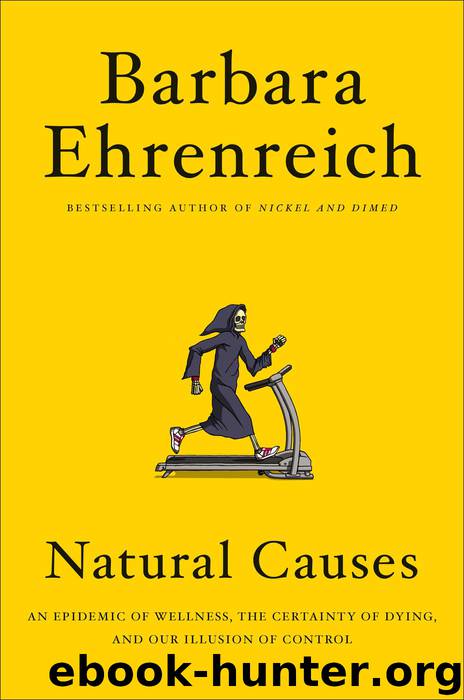Natural Causes by Barbara Ehrenreich

Author:Barbara Ehrenreich
Language: eng
Format: epub
Publisher: Grand Central Publishing
Published: 2018-04-10T04:00:00+00:00
At times the notion of a “system” and a “whole” were almost indistinguishable. For example, something called the “mindful economics movement” sought “to engage a holistic and systems analysis of economic problems associated with capitalism.”5 “Holistic” was good; anything less was a capitulation to the Enlightenment, science, capitalism, or whatever other evil force was believed to have smashed the human world into antagonistic fragments. To be holistic was to be kind, peaceable, and inclusive, which of course is how every vendor of services seeks to be seen. You can even find “holistic dentists,” although a focus on any particular part of the body seems like a violation of holism.
It can be hard to discern any possible common ground between the two paradigms. At the extreme of scientific reductionism we have the fabled doctor who is so lost in the “parts” that he or she can no longer see the whole human, and refers to a patient as “the gall bladder in room 302.” As we have seen in earlier chapters, medical education—beginning with the first corpse dissection—seems intent on removing any emotional connection between the patient and the physician. The patient is objectified, her conscious participation being required only in the form of “compliance.” At the other extreme of congeniality would be the massage therapist I went to for lymphedema following surgery. She was a chatty, empathetic young woman, who in a dimly lit room gently fingered my chest and arms to the accompaniment of recorded trance music. (Not surprisingly, several sessions of this did nothing for the incipient swelling, which I insisted on measuring before and after.) To its critics, the scientific approach is cold, rationalist even, in the view of feminist theorist Vandana Shiva, “imperialistic,” while alternative approaches are soothing, nurturing, and somehow aligned with the cosmos. The philosophical gap here is at least as great as the one thought to exist between science and religion—and wars have been fought over less.
Spats still break out from time to time, as in 2005 when the Society for Neuroscience provoked protests by inviting the Dalai Lama to speak on meditation and mindfulness at its annual conference. But even by the late twentieth century a fertile area of overlap had opened up between science, particularly quantum physics, and what we might loosely call the counterculture. Timothy Leary, the LSD pioneer, and Werner Erhard, the founder of EST, were both attracted to quantum physics, which a layperson could readily sample at venues such as Big Sur and the Santa Fe Institute. Meanwhile, some scientists and historians of science were beginning to mutter about the need for a more holistic approach within science itself. Philosopher of science Evelyn Fox critiqued reductionist biology’s emphasis on “master molecules,” such as DNA, at the expense of the whole organism. At a somewhat less respectable academic level, the physicist Fritjof Capra discerned a continuity between quantum mechanics and Eastern mysticism and asserted that the natural world was not made up of discrete subunits, but of interacting vibrations.
Download
This site does not store any files on its server. We only index and link to content provided by other sites. Please contact the content providers to delete copyright contents if any and email us, we'll remove relevant links or contents immediately.
| Anthropology | Archaeology |
| Philosophy | Politics & Government |
| Social Sciences | Sociology |
| Women's Studies |
Nudge - Improving Decisions about Health, Wealth, and Happiness by Thaler Sunstein(7684)
The Fire Next Time by James Baldwin(5417)
iGen by Jean M. Twenge(5399)
Adulting by Kelly Williams Brown(4556)
The Sports Rules Book by Human Kinetics(4372)
The Hacking of the American Mind by Robert H. Lustig(4356)
The Ethical Slut by Janet W. Hardy(4234)
Captivate by Vanessa Van Edwards(3831)
Mummy Knew by Lisa James(3671)
In a Sunburned Country by Bill Bryson(3526)
The Worm at the Core by Sheldon Solomon(3473)
Ants Among Elephants by Sujatha Gidla(3452)
The 48 laws of power by Robert Greene & Joost Elffers(3208)
Suicide: A Study in Sociology by Emile Durkheim(3003)
The Slow Fix: Solve Problems, Work Smarter, and Live Better In a World Addicted to Speed by Carl Honore(2993)
The Tipping Point by Malcolm Gladwell(2897)
Humans of New York by Brandon Stanton(2860)
Handbook of Forensic Sociology and Psychology by Stephen J. Morewitz & Mark L. Goldstein(2691)
The Happy Hooker by Xaviera Hollander(2681)
